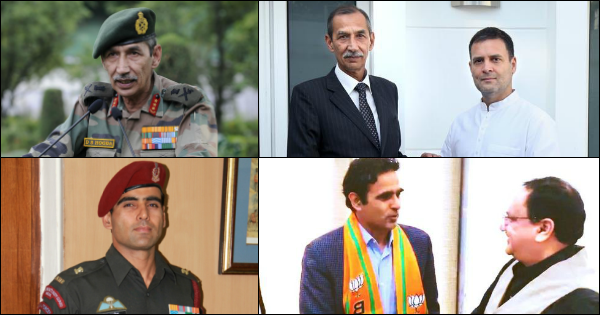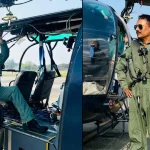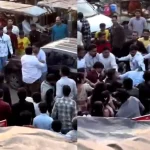Most of us, who don’t belong to a military family or those who don’t know any soldier in their immediate vicinity, have the flimsy views and opinions about them projecting and perceiving them as someone they are not. Movies have already projected them in a certain comic manner where you will see them uptight even in the civilian surroundings, and marching in a funny way as if they are at the drill square. Some of them have views that soldiers are always shouting the orders or following them, and don’t have much knowledge about the civilian world and their only work is to wield a gun and speak nothing. How wrong most of us are and what made us think that it’s the norm? A recent survey tells us that Indian Armed Forces are the most trustable organisations in the entire nation and no one doubts upon their integrity or their methods to tackle issues pertaining to the security of the nation. Lately, a number of highly decorated and motivated soldiers are joining the politics as they feel that this way they can make a difference even after their service period. Some people raised their voices against their decision as they don’t want them to enter politics as according to them a soldier shouldn’t join politics as it will affect the image of the army. What they don’t understand is that a soldier has the same freedom that any other citizen has in their life.

Certainly, there are umpteen numbers of things that we misunderstand about our soldiers and their life and here is a try from my side to throw a light upon that issue:
- They are normal humans and have limitations:
They aren’t superheroes who can kill 20 terrorists in one go and rather ordinary humans with some best training at hands who know how to work in a team and extract maximum productivity. They have a set of strengths and weaknesses. They don’t hide their weakness or mask them but they work upon them to have control over them. The thing which makes them different from ordinary civilians is their attitude of remaining calm even in the wildest of the situations and to work their way out even if they are on the edge of breaking down. We have set our conditional expectations by their life in forces that we begin to think that these guys don’t think beyond what they are tasked with and don’t know much about the social threadbare which we are acquitted to in a detailed manner.
- They don’t have their own opinions regarding politics or other national interests:
They have opinions of their own but since they are under an oath to follow the rules of armed forces, they aren’t free in their service period to publically express them. But under no conditions, this thing binds them post-retirement as they have now full freedom to pursue any kind of profession or express any kind of views which align with their thought process or political inclination. All the soldiers cross the political spectrum and believe me; they don’t think or believe in the same things at all. They had their own reasons to join the forces, and they stayed for their reasons and opted out for their own reasons. They suffer in silence for their friends, family and nation and when they want to do something out of the league, accusations come flying and tell them to stay back as they shouldn’t join a political party or express their views as its hurting our tiny egos as we aren’t able to digest that they can have their own will and freedom of speech too.
- They don’t have feelings and emotions and nothing can affect them:
We are under an illusion that soldiers don’t have any feelings or emotions and work like a machine and shouldn’t ask for their rights or express their political views even post their retirements like their civilian counterparts do even when in their service. This isn’t democracy as it’s a fashion to demean soldiers, who have protected you all their life, under the freedom of speech. A soldier becomes a moron, blot, disgraced etc., as soon as he tries to enter the politics to better the conditions for the upcoming generations. We want clean politics but we don’t want clean men to enter them as it doesn’t suit our ideology. What an irony?
IMPORTANT – Download eBooks for SSB Interview Preparations
- Thematic Apperception Test – TAT
- Lecturette Topics Part-1 eBook [100 Topics]
- Word Association Test – WAT
- Situation Reaction Test – SRT
- Officers Intelligence Test – OIR
- Current Affairs for All
- Army shouldn’t concern itself with the decisions of the civilian leadership pertaining to the security of the nation:
The army is completely apolitical and has kept itself meticulously aloof from the political tussle and it has helped it to concentrate on its primary role. But civilian leadership decides the course of action and one bad decision can take back the army to 10 years. Some “eminent intellectuals” has expressed their anguish when current army chief expressed his concerns about the security of the nation as any political decision in an area like J&K and North East parts impacts the functioning of the army and is the chief of the army he has every right to express his views regarding the same as it’s his men who will face the brunt of the bullets. Now, what did he get in return? Some jibes and derogatory remarks from low-level politicians and editors calling him a Sadak Chhap Gunda, and a Security Guard who shouldn’t concern himself with political decisions.
- Officers enjoy a lot while men under their command suffer a lot:
Officer-men relations often comes into the limelight when some journalists twist the stories to suit their own propaganda and make us believe that high injustice is being done upon the NCOs by their superior officers. Officer-men relations form a strong point in our army where mutual care and respect form the foundation of a lifelong career. In Indian Army, when officers are freshly out of their respective academies then they are put through the same routine which their men follows and live in the barracks with their men. They live, eat; work and play with their men and this could be called an acceptance phase of the new officer. Sahayak system is thoroughly misrepresented by the media, though there are some rare events of misuse where the perpetrators were punished, and has been a traditionally followed system where an officer is aligned with a Jawan so that he shouldn’t be bothered with the mundane matters. Officer-men relations are the foundation upon which the fighting efficiency of any unit rests and in turn of the whole Indian Army.
- They don’t have to worry about anything and don’t have many responsibilities outside the army life:
People have the wrong notions that soldiers and officers have their life sorted out as all of their needs are looked over by the army. Of course, their housing, medical and education responsibilities for their families are handled by the in cantonment facilities but at the same time, there is much more to the life of a soldier than just these basic essentialities. Sometimes they are worried about the ongoing case about their ancestral land with other people of the village, sometimes it’s family feud and sometimes their family is in immediate need of money or something else. These kinds of things increase their responsibilities to many folds as they are beyond their control in certain manners. How good it will be when ordinary citizens will stand up to protect families of the soldiers from troubles by anti-social elements and government officials who are shamelessly asking for bribes. It’s all good to show the solidarity from the internet but how many of us went out of our way to help their families when they are away on the borders?
Just because a soldier’s political inclination and views aren’t in alignment in ours, we started name calling them and start questioning their entire service period. We want clean politics but whenever a soldier or an honest man tries to do so, it’s not digestible for us anymore. We want to curb their freedom and speech under the garb of the very service that they had done for you and me. Remember, many great leaders of the international politics such as Benjamin Netanyahu, George W Bush Senior, Jaswant Singh, Captain Amarinder Singh, General VK Singh, Colonel Rajyavardhan Singh Rathore and many others were once in the military and they have, indeed, made a difference in the political arena.














